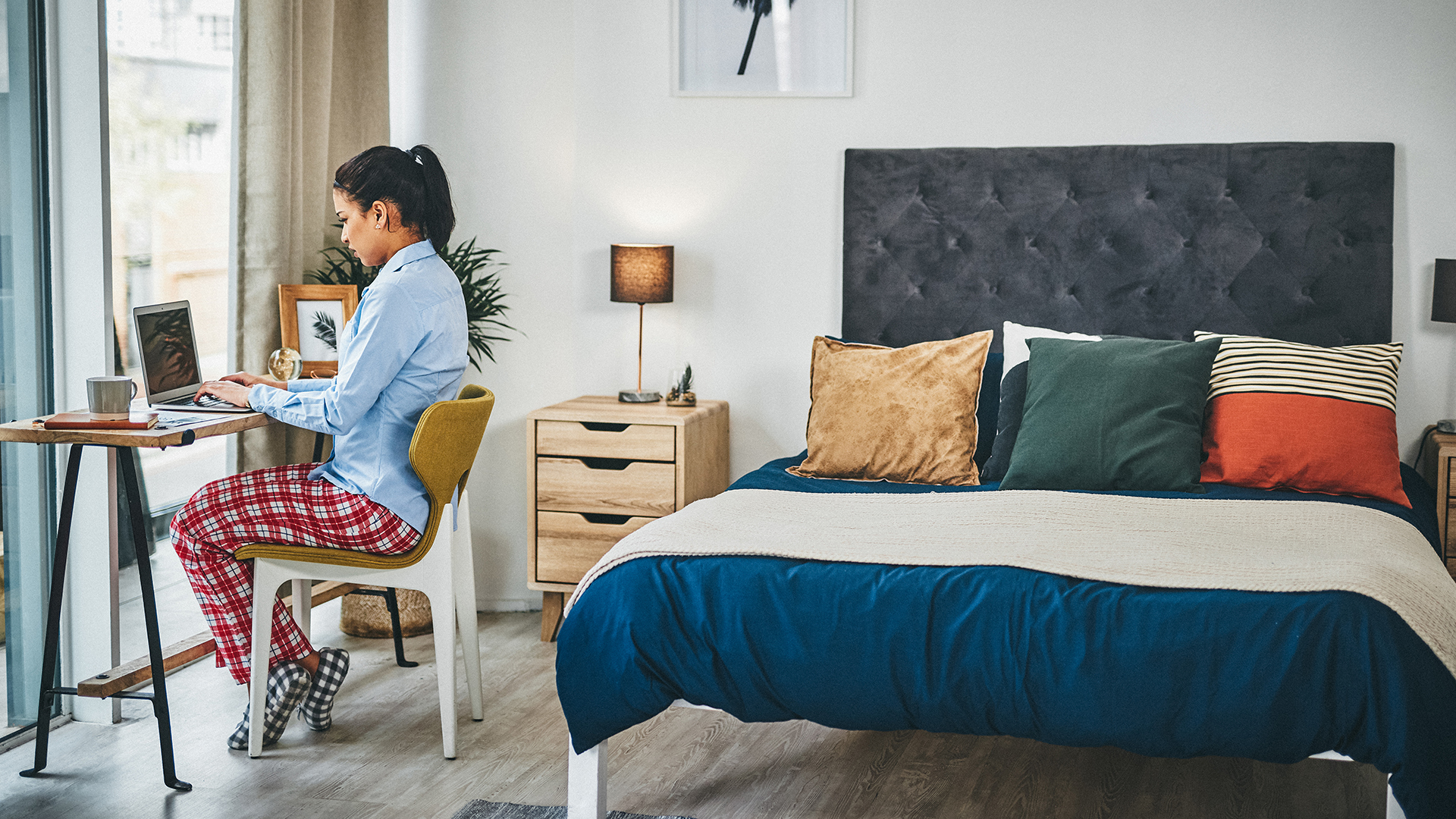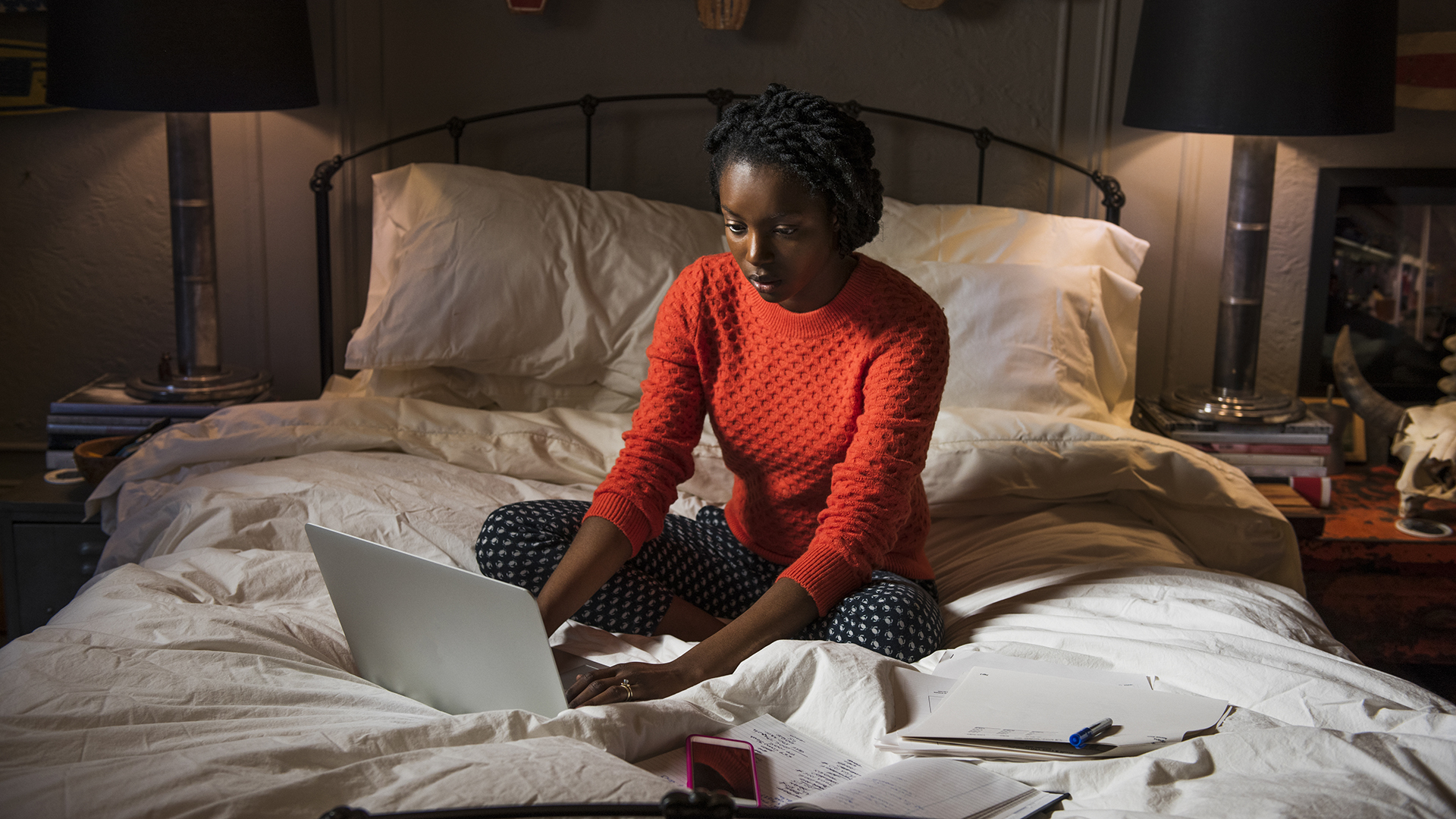I work from my bedroom – here's how I stop it from ruining my sleep
How to stop taking your work to bed

Bedrooms should be a sanctuary for sleep; a place where you can switch off from the world and focus on relaxation. So it's no wonder that sleep experts are united in their dislike of the office bedroom. But for many remote workers, a desk in the bedroom is a necessity for quiet working conditions, even if sleep suffers as a result.
I'm a hybrid worker, and when I'm at home, my bedroom is my office. However, I really love my sleep and having spent three years working from the same corner of my room, I've found ways to stop my home office from disrupting my dozing. And because I know how important it is to get as much sleep as you need, I want to share my tips with you.
But before we get started – if your office is in the bedroom, it's important that your setup is as comfortable as possible. Our best mattress and best pillow guides ensure your sleep is supported, while our guide to the best office chairs can take care of you during the day.
Why are bedroom offices bad?
Having your office in your bedroom erodes the distinction between 'work' and 'rest', as these two very different activities happen in the same place. This can cause the stresses of the day to follow you into the night, making it harder to fall asleep and stay asleep.

Without a clear separation between your office and your sleep environment, you might struggle to switch off at the end of the day. Your desk is just over there, why shouldn't you check a few emails before settling in for the night? But this is a bad idea on several levels.
As well as exposing yourself to sleep-disrupting blue light, you'll also be exposing yourself to the stress and anxiety associated with the office. (No matter how much you might love your job, answering emails is no replacement for counting sheep.) Rest, relaxation, and work can become jumbled into one big mess, resulting in disrupted nights and a lack of focus during the day.
How I make my bedroom office work
While I'd rather my desk wasn't in my bedroom, unfortunately, it's the only viable place for it to be – and I know many people share the same problem. But after multiple years working from the same corner, I've come up with some tricks to ensure I don't take a day at the office to bed with me:
Get daily insight, inspiration and deals in your inbox
Sign up for breaking news, reviews, opinion, top tech deals, and more.
1. The morning is just as important as the evening
I can talk a lot about how important it is to put away work at the end of the day (and I will do, in a bit). But it's also important to step away from work at the start of the day. During what might be considered my commute, I make a conscious effort to stand back from the 'office' part of my bedroom until my work day officially starts.

The 10-3-2-1-0 sleep method recommends stopping work two hours before you go to bed, and I recommend echoing that in the morning. By giving myself at least an hour away from my desk, I can wake up, get ready, and get my brain into gear before starting work. By waiting for my drowsiness to (mostly) clear, I avoid associating sleepiness with checking my emails.
2. Introduce lots of light
My desk is in a corner that doesn’t get a lot of light (and, unfortunately, in a country that doesn’t get a lot of sunshine). This isn’t great for my circadian rhythm, which needs light in the morning to help me feel awake, and dark in the evening to help me drift off. Low light all day means my body clock isn't sure what's going on.
For that reason, on the days when the clouds aren’t cooperating, I use a SAD wake-up lamp to create my own daylight. Giving off a strong white light, the lamp makes it feel like a bright morning, even when my desk is still in the dark. In the afternoon, I either switch it off or swap to a softer, calmer light to get me ready for the evening wind-down. This way, when I go to bed at night, the lighting doesn't remind me of being in the office, and my body clock feels like it has followed the natural rhythms of the day. Which brings me to my next point...
3. Get outside at the end of the day
Remaining active is an important part of sleep hygiene, and exercise can help you sleep. But when I'm working from home, I lose out on a lot of basic activity simply because all my rooms are so close together (my best fitness tracker might barely register triple digit steps). To counter this, I make an effort to get out almost as soon as I finish work every day. Not only does this get me moving, which helps me sleep, it also sets a distinct end to the day, which, again, helps me sleep.

On the occasions when I can't get out for whatever reason, I make sure to leave the bedroom when I put my work down. Even if it’s just to go and stand in the kitchen, stepping back from the office means I can’t pick up my laptop for just a few more minutes that accidentally stretches into an hour.
4. Stay out of bed
With the bed right behind my desk chair, it can be hard to resist the lure of crawling under the covers with my laptop. But I've tried working from bed and as well as being super uncomfortable (beds are not made to be desks) it's also disastrous for my sleep and my work. During the day, it feels like I should be sleeping. At night, I can't shake off the feeling that I should be at work.
To help me resist bed working (it's harder than you think – I write about mattresses all day), tidying my sheets is an important part of my morning routine. I also quickly declutter my bedroom, so it feels less like a cozy bedtime space, and more like a work environment.
5. Stick to a bedtime routine
I'm a hybrid worker, and the days I'm in the office look very different to the days I spend at home. To avoid this from completely disrupting my schedule and giving me social jet lag, I try to keep to a consistent bedtime routine.

I start my wind-down at roughly the same time every night, whether I've been at home all day or I'm not long off the train. And while my mornings look pretty different depending on where I'm working, I try to keep some consistency by setting my 'at-home' alarm within an hour of my 'in-office' alarm. By giving myself time in the morning to wake up and time in the evening to switch off, my work feels contained, and doesn't encroach on my sleep.

Ruth is TechRadar’s Sleep Writer. She’s here to help you find the perfect sleep setup for your budget and personal preferences. As well as keeping a keen eye on everything that’s going on in the world of mattresses, she regularly speaks to experts to help you learn how to improve your sleep habits, whether that’s by debunking sleep myths or explaining the science behind it all. Prior to joining the TechRadar team, she wrote features and product guides for new parents hoping to get a decent night's sleep, as well as writing for a variety of online spaces.